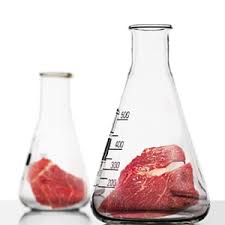- Like
- Digg
- Tumblr
- VKontakte
- Buffer
- Love This
- Odnoklassniki
- Meneame
- Blogger
- Amazon
- Yahoo Mail
- Gmail
- AOL
- Newsvine
- HackerNews
- Evernote
- MySpace
- Mail.ru
- Viadeo
- Line
- Comments
- SMS
- Viber
- Telegram
- Subscribe
- Facebook Messenger
- Kakao
- LiveJournal
- Yammer
- Edgar
- Fintel
- Mix
- Instapaper
- Copy Link
From Tofurky sausages to Gardein chicken to Daiya vegan cheese, plant-based meats and dairy products are quickly gaining popularity–and winning over the hearts and tastes of thousands. In fact, according to the U.S. Dept. of Agriculture, meat consumption nationwide has decreased 12% since 2007–and more people are searching for information on vegan eating.
Despite this progress, the majority of Americans continue to eat meat — so imagine the suffering that could be spared if this meat didn’t involve raising and then killing an actual animal? Sure, it may sound like science fiction, but growing meat from cells in a lab (referred to as in vitro meat) may be one way we can help save the lives of tens of billions of animals who are raised and killed for food each year across the globe.
Just this week, the New York Times reported in-depth about one researcher, Dr. Mark Post, who wants to show the world that meat doesn’t have to come from a farm–or even from a living animal — but rather from a few cells in a lab. And not only will this benefit animals but it’s also better for the environment and our health.
Despite many doubts, Dr. Mark Post has created a hamburger that has grown in a laboratory from cow stem cells. Dr. Post will cook and serve this hamburger sometime in the next few weeks at an event in London. The purpose of the event is to prove first and foremost this can in fact be done as well as to obtain funding for further research, which will hopefully lower the costs associated with growing meat in labs.
Currently, the costs to make an in vitro hamburger are astronomical–$325,000 for this showcase burger. However, Dr. Post says that like any technology, the costs will come down.
And if they do come down to a price comparable to the cost of meat in grocery stores, it’s estimated that mass production of this meat would reduce water and land use as well as CO2 emissions by 90% or more. This statistic is extremely significant when you consider the fact that raising animals for food is the leading cause of pollution and resource depletion.
Not sure what to think of in vitro meat? Check out NewHarvest.org, a non-profit organization dedicated advancing alternatives to conventionally produced meat to learn more.
With scientists around the world urging people to eat less meat and researchers reporting that the average American can do more to reduce global warming emissions by not eating meat, eggs, and dairy than by switching to a hybrid car, perhaps in vitro meat will be part of the solution to the world’s most pressing environmental issues.
But, as scientists have warned, action–for the environment, human health and animals–needs to be taken now, not in ten years when in vitro meat is widely available. Start today by exploring the variety and abundance of plant-based options available. Choosing to leave animals off your plate will benefit your own health, the well-being of the planet and of course, animals.
Visit TryVeg.com to find vegan recipes as well as plant-based alternatives to meat, cheese and dairy.


Comments 1
Pingback: Global Warming and Population Ethics: How to Evade the Worst of Both | theauricle